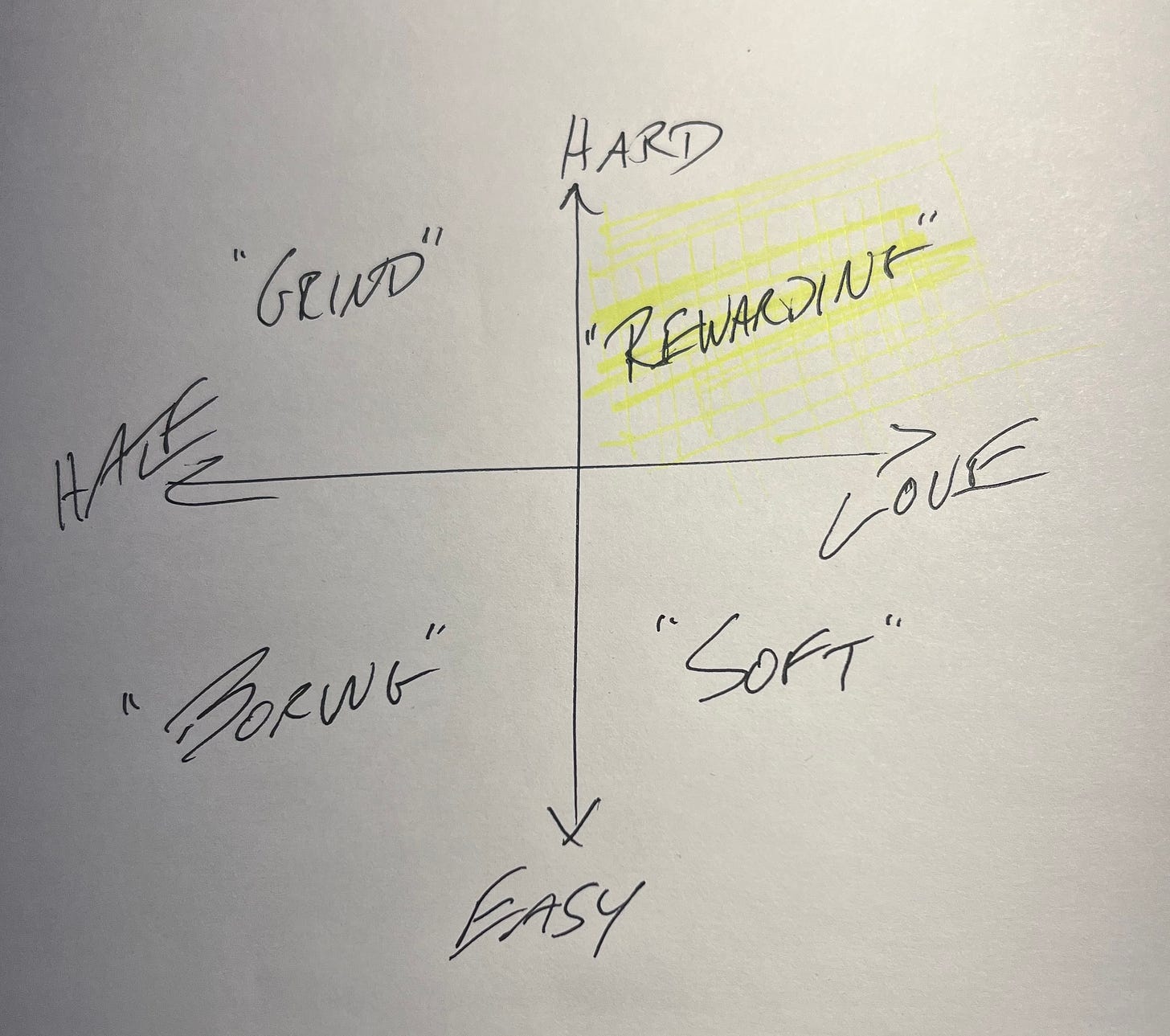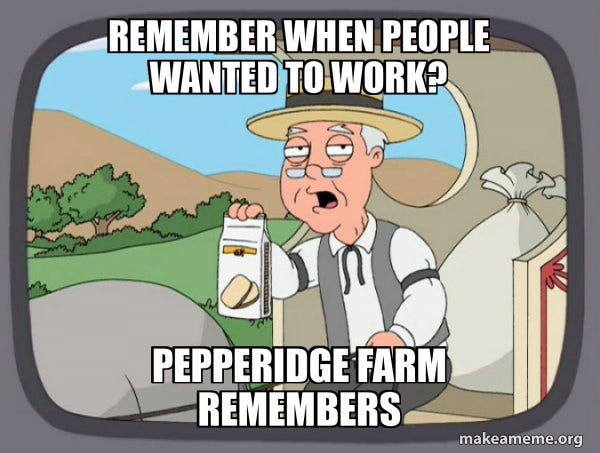Nobody Wants to Work Anymore
Not like this, anyway. Nobody ever did.
Many years ago Arthur Conan Doyle wrote:
The work is its own reward.
This fucking guy.
The words flowed from Doyle’s pen into the mouth of Sherlock Holmes, who ruminated on the importance of making an honest living. Holmes believed that few things were more important than a reputation earned through tireless and honest efforts.
At some point, someone — a manager, probably — rewrote the slogan as “Hard work is its own reward” and now it’s something we hear all the time.
But Doyle never said that. Holmes never said it. Know why?
Because, reader, it is not true.
Your Best You
People describe their work as rewarding when they’re performing at the uneasy intersection of the upper-right quadrant represented in this crude diagram — doing challenging work that we enjoy.
I am generalizing, of course! I had a girlfriend who claimed to love doing mindless, repetitive work at the office. She did statistical analysis of quantitative market research — processing scanner data from thousands of supermarkets. Her definition of “mindless” may have differed from mine.
I do think there are plenty of people would love to have a job that yields neither much resistance nor surprise. Personally, I suck at that. I fail most often at tasks that should be easy, when I find it difficult for them to sustain my attention, even when not much of it would be required.
I do my best work against an unattainable objective that must be attained by no later than yesterday. From getting to know some of you, I’m certain a few can definitely relate.
People who I find intelligent and interesting often seem happiest at work when they’re doing something hard. They seem to want work that is fairly challenging and report growing disenchantment with jobs that fail to utilize their full potential. They want the opportunity to learn and grow rather than to coast.
So, work is its own reward when the work is rewarding.
Is yours?
The Year 2000 Problem
There’s a stereotype that the Millennial generation is lazy and selfish. This drives me absolutely crazy because it always seems to come from people who are remembering a time when everything was objectively worse for everyone on the planet.
I cannot think of anyone I’ve met in the professional workforce who I’d describe as lazy and entitled.
It’s not hard to prove that today’s workforce has higher expectations for their managers and employers than we did 50 or 100 years ago. The National Labor Relations Act (the “Wagner Act”) was passed in 1935 in response to systematic exploitation of labor by industry dating back to the earliest days of the coal era.
(The origins of the act date back to the Colorado Coalfield War which, in 1913, was spawned by deplorable conditions endured by fuel and coal workers. The uprising itself culminated in many violent incidents. Workers were murdered in droves by interests aligned with their employers. The NLRA became law over conservative opposition1 which complained bitterly about any rule that “unacceptably obstructed” the free flow of commerce and that ignored the “laws of economics” that would render the U.S. industry vulnerable to the threat of foreign competition.)
I think a big part of these complaints come from the idea that our expectations of the workplace are higher, even though the work itself may have gotten easier, or safer. This is, I think, confusing two separate but related issues.
The most discontent workers, I’ve noticed, often complain the most about the aspects of their jobs that are not integral to the actual work itself. I am less likely to hear complaints that the workload is too high or the job is too hard. It’s more common to hear from people who complain that they are:
Not motivated, recognized, rewarded, praised, acknowledged, or even noticed.
Operating in an environment that is carelessly and ignorantly unaware or even hostile to what they consider basic human values.
Expected to make performative but meaningless displays of “engagement” in team-building or morale exercises (like returning to the office) while also being asked to ignore the greater risk that they’ll in so doing experience harm from sexism, racism, worker exploitation, and/or becoming complicit in dishonest, amoral, and illegal business practices in the name of creating shareholder value.
All of that is Tuesday in a big American corporation, but it rarely distracts from our cultural worship of the wealth they manufacture for their executives, managers, and shareholders.
Does Anybody Want to Work
So what about the Boomer’s lament: “nobody wants to work anymore”?
Well, it’s true. It’s true if “nobody” means “people younger than me” and “work” means “work in a dangerous factory environment like we all did after the war.”
Actually — they do want to work! Corporate parking lots are not crammed with the automobiles of people who don’t want to work. They are not clogging the busses, subways, and expressways every morning. Corporations are not algorithmically reducing pay, cutting benefits, and firing the 15% of their workforces that simply have no more fucks to give.
The companies are, or were, full of hopeful and ambitious people who suffered through inhumane and alienating recruiting tactics, survived layoffs motivated by feckless greed and avarice, and are slowly being forced to return to offices even in the face of stark evidence that this is against the interests of everyone but their landlords.
If there’s anything that sets apart the workplace culture of the younger generation, it’s the sudden ease with which they’ve arrived at this revelatory idea:
It does not make sense to entrust the trajectory of your career to a corporation that can scarcely be bothered to treat you and your colleagues like human beings.
One Last Fuck to Give
Nobody wants to work anymore. Not under deplorable conditions, for evil corporations, for hypocrites, racists, abusers, assholes, or Nazi apologists. (A weird apparent exception for an employer who is all of the above.)
Nobody wants to breathe second hand smoke at work anymore! Nobody wants to be exposed to carcinogens, or be forced by their employers to break the law! What’s the world coming to?
Nobody wants children to work in factories anymore. They’re always complaining, and they always want to be fed!
Women don’t want to do more work anymore for less money. Nope, not like they used to!
People who are not white, or not the same religion as you, don’t want to be excluded from the workforce anymore.
People who were born in a different country than you don’t want to be worked to death while enriching the country they nearly died getting into.
They never did. Okay, Boomer?
Here are a few ways to think about the ideas that have changed what it means to work in our increasingly dangerous world at work:
When you encounter someone whose ideas seem entitled, or fragile, ask yourself this: Is the problem that I wish these people wanted those things less? Or is the problem that I wish I wanted those things more?
If you’re leading a team that seems difficult to motivate or inspire, try asking them what changes you could make that they might appreciate the most. Worried they might ask for something you can’t deliver? Don’t fret! That’s easily resolved by simply re-inserting your head even deeper into the sand. if you aim carefully, you won’t even have to dig a new hole.
If someone makes a big deal out of something at work that isn’t important to you, try to remember this: You literally just said it’s not important to you, so why not just fuck off for a bit while the grownups talk. Thanks!
People increasingly report feeling their contributions are not noticed, their victories are not celebrated, and the achievements are not rewarded. Is this entitlement and fragility conditioned by the continuous expectation of gold stars and participation trophies? Perhaps. Are gold stars and participation trophies cultural adaptations that make us safer, happier, more inclusive, and productive? Damnit, also yes!
That’s all for this week, thank you for reading.
Join us next week, we’ll talk about what the type of water bottle you bring to the office says about you.
Here’s a fascinating paper on how labor laws have failed to get the intended result in the US.






I may be living all of this. The true reasons that make people not want to work, that is. As usual, you minced no words and summarized brilliantly.